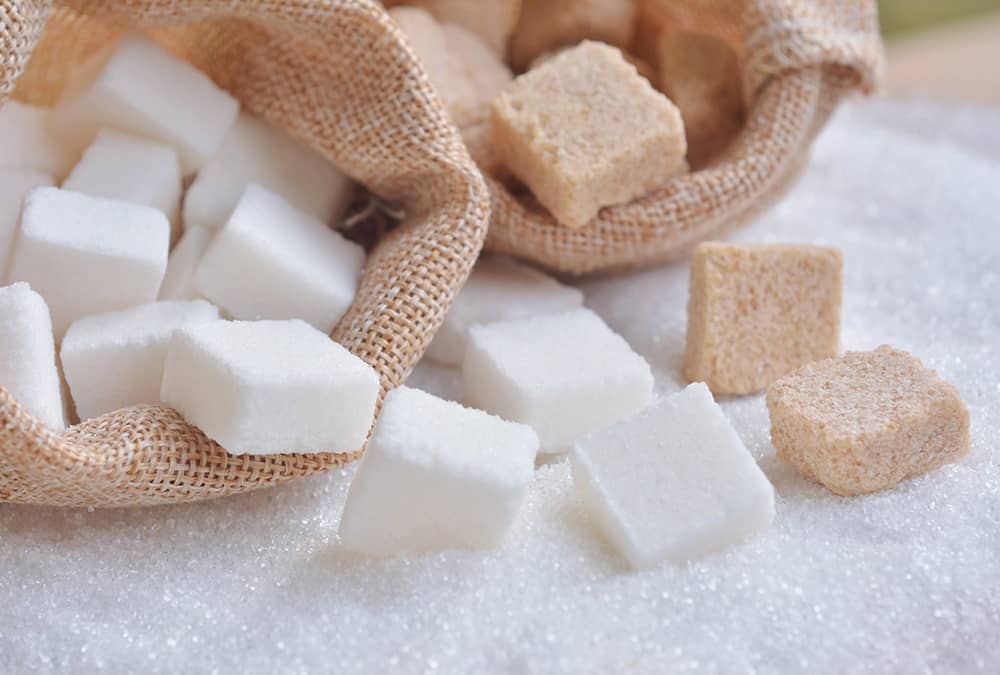Are you new to the prevalent keto diet? Then low-carb sweeteners can help break away the sugar urges. Well yes, if you don’t know this yet, you can still relish sweet foods that make a low-carb eating plan more appealing. The caution? You might need to use them in moderation. Keep reading to know why!
What Are Sweeteners?
Food additives or Sweeteners are used in order to facilitate a sense of sweetness during consumption.
The use of sugar has become decreasingly popular in the last few decades and researchers have found and developed new ways to sweeten our food without the actual use of sugar. Obtainable substitutes for sugar are called sweeteners.
Different kinds of sweeteners are available all over the world. While some are present in nature, others are made synthetically. Every one of these has its own type of sweetness, uses, and applications.
And while there are so many sugar options to choose from, how to pick the best sweetener to use for low-carb desserts and add sweetness to other keto foods? Well, that really depends on your preferences and taste.
Here we’ll look at the most common of all the different types of low-carb sweeteners we face, and which are the best to choose.
Learn More
Natural Sweeteners
Basically, natural sweeteners are sweeteners produced from concentrated components of edible plants. An issue however with natural sweeteners, is that natural does not also mean healthy or keto-friendly.
Multiple natural sweeteners come with enough net carbs to kick you out of ketosis and induce a roller coaster of sugar cravings. While researching whether or not a sweetener can be a part of your diet, you must examine it on its own and learn how it affects the body.
-
Stevia
The most adored, Stevia is a nonnutritive sweetener. Now this means it has almost no calories. So if you’re trying to lose some weight, this aspect may be very appealing. Frequently touted as a safe and healthy sugar substitute that can sweeten up foods without negative health effects.
In general, it is an agreed fact- stevia is the most keto-compatible sugar substitute available. So it is important on keto to look for sweeteners with a low glycemic index, which is a measure of elevated blood sugar. A lower glycemic index is much better for keto dieters.
-
Allulose
So one of the most sugar-like low-calorie sweeteners on the market, Allulose is something that is made up of a monosaccharide (a simple sugar) that is present in small quantities in wheat, certain fruits (like jackfruit, figs, and raisins), and some sugary sweeteners (like maple syrup and brown sugar).
The only thing that you would need to be cautious about with this sweetener is that the long-term effects it has on the microbiome are not yet known. though, allulose has only been found to cause positive effects. So, it is not recommended to have on the Keto Diet.
-
Monk Fruit
Luo Han Guo or “Buddha fruit.” or Monk fruit is a small, round fruit grown in Southeast Asia. This has been utilized for centuries in Eastern medicine as a cold and digestive aid, and now it is also being used to sweeten foods and beverages.
Extracts of Monk fruit have no calories and no carbs, making it a great option for a ketogenic diet. Mogrosides may also stimulate the release of insulin, which can enhance the transportation of sugar out of the bloodstream to help manage blood sugar levels.
-
Tagatose
This one naturally occurs in dairy, fruits, and cacao. While it is a simple sugar like glucose, tagatose is metabolized differently. It allows this to be 92% as sweet as table sugar with a fraction of the calories (only 38%) and a minimal effect on blood glucose and insulin levels.
So because of its relatively low glycemic index, tagatose only has a small effect on blood sugar levels and can be used with other sweeteners in a keto diet. Also, it has some health benefits attached to it like increased HDL cholesterol (read more about cholesterol) and improved gut health.
Artificial Sweeteners
Sugar substitutes that are produced using synthetic methods are called Artificial sweeteners. It’s the most scrutinized category of sweeteners with nothing but fear-mongering articles purporting how terrible they are.
The single truth behind the health effects of these sweeteners, however, is much more complicated. All of these are divided down in the body in varying regions of the gut and have been found to affect each gender and ethnic population differently.
-
Sucralose
The good part about it is that sucralose can typically be present in pure form (liquid and powdered) too. So this goes an extremely long way when it comes to sweetening things: it’s 600 times sweeter than sugar. The Glycemic index for pure sucralose is 0, so you can use this as you would stevia extract.
Now in a pure form, it has little to no effect on blood sugar levels. Since it has no nutritional value, it is practically not absorbed by the body, mostly excreted unchanged in the feces, and the little that is absorbed is excreted intact in the urine.
Learn More
-
Aspartame
This one is probably the most controversial sweetener of them all. Also, behind many stories of numerous sclerosis, systemic lupus, methanol toxicity, and blindness, among many other things. This is a very common sweetener that is present in many low-carb products and diet drinks out there.
So it may be best to stay out of this one as there are better alternatives. And it\’s still better to be safe than sorry, so it would be great to not consider it as a great substitute for sugar on a keto diet.
-
Saccharin
As the popularity of saccharin has gone down significantly, this sweetener is not very commonly present anymore. Although it is still in the top 3 artificial sweeteners, which is why we mention it, it is dwindling in usage.
Apart from the controversy surrounding saccharin, another reason to avoid it is that during the cooking process, it can cause an extremely bitter aftertaste. Considering that many of us use low-calorie sweeteners for keto baking, this sweetener just isn’t practical on any level.
Sugar Alcohols
This lies in the category of sweet carbohydrates that are partially resistant to digestion. Most of them are made using natural processes (like fermentation) while others are produced using artificial processes (like hydrogenation).
The name “sugar alcohol” refers to a category of chemical compounds, not ethanol. As sugar alcohols have a similar chemical structure as sugar, they activate the sweet taste receptors on your tongue.
So unlike most artificial and natural sweeteners, sugar alcohols contain calories and net carbs, just fewer than plain table sugar.
-
Erythritol
This low-calorie sweetener erythritol may seem too good to be true. This is natural, doesn\’t cause side effects, and tastes almost exactly like sugar but without the calories. Also, is a sugar alcohol and a low-calorie sweetener with only about 6% of the calories present in sugar.
Basically, Erythritol has zero calories and is about 70 to 80% as sweet as sugar. And it also has zero net carbs, so it doesn’t count toward your daily carb allowance on keto.
-
Xylitol
Well, Xylitol is a naturally occurring sugar alcohol that is usually present in fruits and vegetables. And, it is as sweet as sugar, but 40% less caloric. Multiple people enjoy this sweetener because it is very close to the sweetness of sugar and can easily be substituted.
The only known downside to using xylitol as a sweetener is that it is more likely to cause stomach discomfort than erythritol. Now because of this, it is not a good choice for a low-carb or a keto diet.
-
Maltitol
Now, maltitol is commonly present in sugar-free products as it is very similar to sugar. So if the packaging says that a product is sugar-free, you will most likely find maltitol on the ingredient list. And the major downfall of this sweetener is that it has quite a large glycemic index – meaning it spikes blood sugars.
So while you are on a low-carb diet, it’s best to avoid maltitol and be skeptical of products that use it. Several times we see people over-consume these products, which can lead to a slowing of weight loss and a decrease in ketone production.
Learn More
Why Should You Avoid Artificial Sweeteners?
This is a no-brainer- we Indians have always had a sweet tooth. Most utmost of us eats the equivalent of 20 teaspoons of sugar a day. Actually, you\’re probably not sucking on sugar cubes throughout the day, but you are probably downing more than your fair share of sugary cereals, snacks, sodas, ice cream, and the list goes on and on.
Concerning the average person, there\’s nothing wrong with sugar per se, unless all the sweet foods in your daily diet are keeping you from eating and drinking the nutritious foods you need. Now, for people who are trying to lose weight, or have to watch their blood sugar because of diabetes, too much sugar can be a problem.
These artificial sweeteners are typically 200 to 600 times sweeter than sugar. These stimulate your taste buds, go to your brain, affect your hormones, and slow your metabolism. So both sugar and artificial sweeteners are addictive.
Just try to avoid these sweeteners at all costs!
- Maltodextrin
- Honey
- Coconut sugar
- Maple syrup
- Agave nectar
- Dates
Desserts Made With Low Carb Sweeteners
-
Keto Brownie
Ingredients:
20 g almond flour, 2.5 g unsweetened cocoa powder, 1g tsp salt, 1/4 tsp baking powder, 18 g Stevia/ erythritol (or any sweetener), ½ Egg yolk, ¼ tsp vanilla, 1 tbsp cup butter, 10 g semisweet baking chocolate, 5 g walnuts
Instructions:
- Preheat the oven to 350°F. Grease the interior of an 8-inch by the 8-inch baking pan. Line the bottom with parchment paper.
- Remove eggs from the fridge and place them into a bowl filled with hot water. You do not want the water to be boiling because you don’t want to cook the eggs. Just use hot tap water from your kitchen sink. This will slightly warm up the inside of the eggs so that when they are cracked open and added to the batter later, they will not cause the butter to harden.
- In a microwave-safe bowl, melt butter in the microwave.
- Whisk sweetener until it is fully incorporated. The mixture should look thick and grainy. Place the bowl back into the microwave and heat for about 40 seconds. The butter should be hot (but not bubbling) and separated from the sweetener.
- Add the sugar and butter together so that it is uniform. You should notice it comes together into a thin, smooth paste and the top should have a glossy finish.
- Now, whisk in the cocoa powder. This will cause some of the butter to separate again, but that is okay.
- Add in warmed eggs, and vanilla, and whisk until the batter is smooth.
- Now, add in the baking powder and almond flour and gently whisk until the flour is just incorporated. The batter should look glossy.
- Stir in 3/4 of the chopped chocolate. Your batter should be very thick
- Pour batter into the prepared baking pan. Smooth and even out with a spatula. Sprinkle the remaining chocolate over the surface.
- Set the brownies in for 20 minutes. If you want slightly underbaked and fudgier brownies, you can remove them a few minutes earlier.
- Allow brownies to set for about 30 minutes before cutting and serving.
Nutritional Information:
Calories: 183.7 kcal, Carbohydrates: 2.9 g, Protein: 1.9 g, Fats: 16 g
-
Keto Chocolate Smoothie
Ingredients:
120 g heavy whipping cream, 1 tsp peanut butter or almond butter, 1 tablespoon unsweetened cocoa powder, 1-2 g stevia, or 1 drop liquid stevia/erythritol, ½ teaspoon vanilla extract, 5 g chia seeds, Ice, and water as needed.
Instructions:
- Add heavy whipped cream, peanut butter, or almond butter ( whichever you prefer ), unsweetened cocoa powder, stevia or erythritol, water, and vanilla extract in the mentioned quantity to a blender.
- Blend them until creamy smooth and add water in fewer amounts initially gradually you can add according to the desired consistency.
- Add ice and blend until creamy, but do not blend for a longer duration as it may lead to a loss in a creamy consistency.
- Enjoy right away.
Nutritional Value:
Calories: 456 kcal, Carbohydrates: 2 g, Protein: 5 g, Fats: 48 g
-
Keto Lemon Chaffee
Ingredients:
2 oz cream cheese, room temp and softened, 1 tsp monk fruit, powdered confectioners blend (add more if you like it sweeter), 2 tsp butter, melted, 2 tbs coconut flour, 2 eggs, 1 tsp baking powder, 1/2 tsp lemon extract, 20 drops cake batter extract, 1/2 cup heavy whipping cream, 1 tbsp monk fruit, powdered confectioners blend, 1/4 tsp lemon extract.
Instructions:
- Preheat the mini waffle maker
- Add all of the ingredients for the chaff cake to a blender and mix it until the batter is nice and smooth. This should only take a couple of minutes.
- Use an ice cream scoop and fill the waffle iron with one full scoop of batter. This size of the ice cream scoop is about 3 tablespoons and fits perfectly in the mini waffle maker.
- While the chaffless are cooking, start making the frosting.
- In a medium-sized bowl, add the chaff-frosting ingredients.
- Mix the ingredients until the frosting is thick with peaks.
- All the chaffless to completely cool before frosting the cake.
Nutritional Facts Per Serving:
Calories- 221, Fat- 20.3g, Carbohydrate- 5.2g, Protein 5.6g
Takeaway
Always keep a check on which sweeteners are good and which ones are absolutely bad for your diet regime. However, even the good ones should always be consumed in a monitored way of course so take care of that and don’t get kicked out of ketosis.
Watch out for sweeteners that are high in sugar and carbs when following a ketogenic diet. These include maltodextrin, honey, coconut sugar, maple syrup, agave nectar, and dates.
Following a ketogenic diet involves limiting your carb intake and reducing added sugar consumption to reach a state of ketosis. Luckily, there are many sweeteners available that can still be used on a low-carb keto diet.
Use these sweeteners in moderation as part of a healthy and balanced keto diet to add flavor while remaining low-carb.
Get started with your Weight Loss Journey today and take a step towards a healthy lifestyle! Stay tuned for inspiring Weight Loss Journeys, and Delicious Recipes! Also, don’t forget to follow us on Instagram for the daily dose of Health, and Wellness content!






















